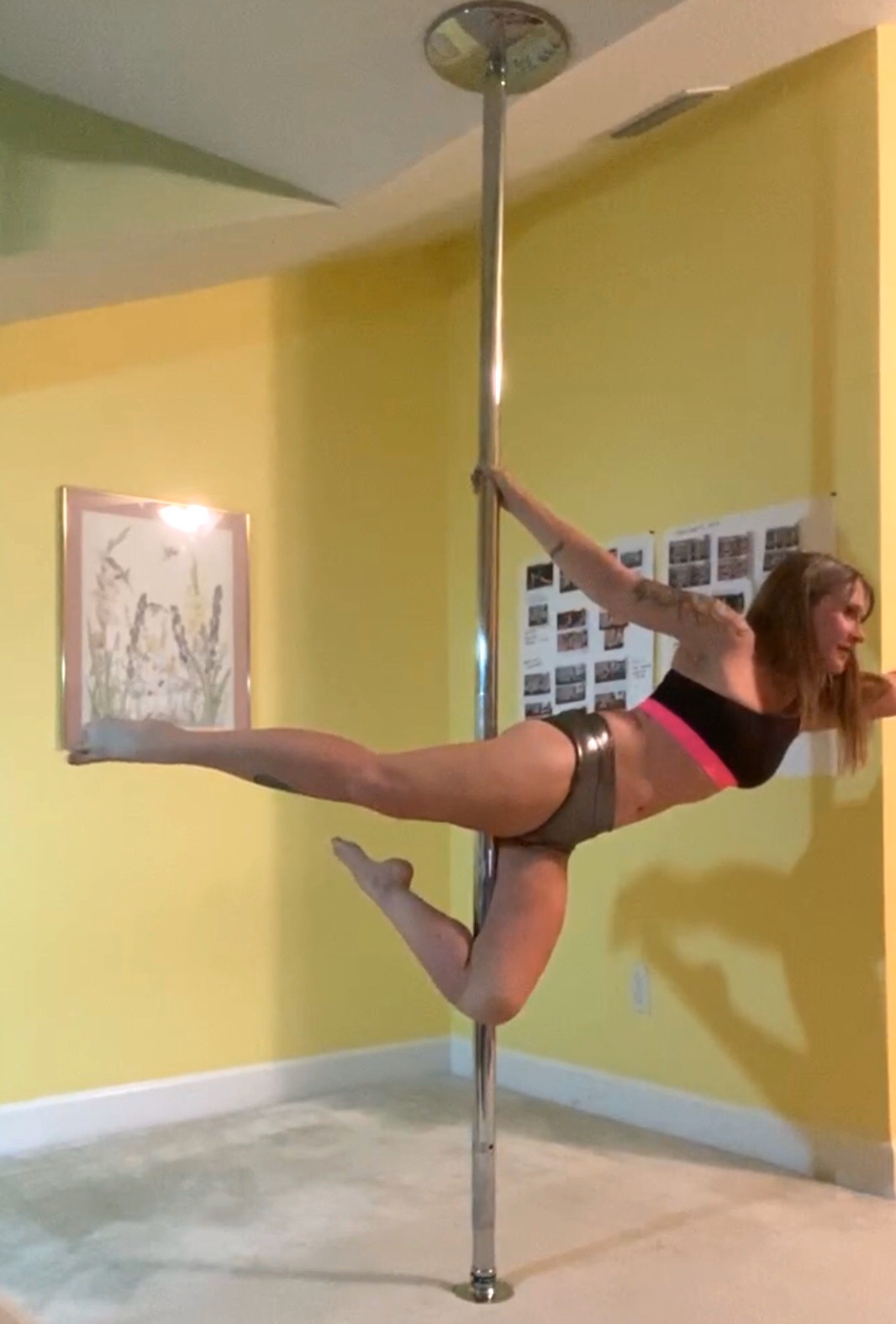
If you subscribe to the inaccurate stereotypes about pole dancing, such as the criticism bantered about after JLo performed at the Super Bowl, you might be surprised to hear about all of the benefits of this sport and why I often recommend it for people of both sexes who have survived sexual trauma and abuse.
I recognized the benefits of pole dancing shortly after I started, early into my 50’s, being inspired by my 20 year old daughter who tried classes while she was away at college and soon became addicted to it. It helps her feel good about her body and herself and she loves the physical challenge and sense of accomplishment when learning new skills. The new friends she made in the supportive community of her studio are an added bonus.
I was always active but with the exception of Jazzercise and walking on the beach or in nature, I never really looked forward to exercise. For years, I’d been searching for movement I enjoyed as much as when I did gymnastics as a young girl, building strength and endurance using my own body weight. As a person who has been recovered from an eating disorder for over thirty years, even though I’ve done a great deal of work on body image and self esteem, the idea of exercising in front of other wearing the equivalent of a bikini (which is done because you need skin to stick to the pole), was a little intimidating, but I took the plunge and tried a few classes. I immediately fell in love, even though it is the most challenging sport I’ve ever participated in.
I soon recognized the benefits of this activity for my many clients who have survived sexual trauma, harassment and abuse. The impact on self esteem from these types of violations is substantial. Victims often describe feeling powerless, angry and riddled with guilt because society and the perpetrator often blames the inexcusable behavior on the clothing, actions or attractiveness of the survivors. One of the most common fears of victims of sexual assault and abuse is that it will happen again. They lose touch with their intuition, disconnect with their bodies and are terrified of looking or feeling sexy. It isn’t uncommon for them to become emotional eaters and gain weight, sometimes unconsciously, to create a barrier between themselves and the rest of the world as the trauma they don’t have the words to express or release is stored in the cells of their bodies.
Survivors also feel like damaged goods and very alone because of the reactions of friends, loved ones and sadly, often the law enforcement community. If the perpetrator is a well respected member of a family or community, the people they abused may not even be believed, or worse.
How can pole dancing help? One of the first things I noticed when starting classes was that it isn’t just for “skinny, perfectly fit” people. Women and men of all shapes, sizes and ages attend and teach and can be quite successful. Everyone is extremely supportive of each other, cheering the others on as they accomplish (or just try) new skills. It’s about practice, not perfection and it’s an incredibly effective way to reduce stress. I don’t think about anything else going on in my life while focusing on the class and laughing with my pole family and at myself.
Successful and safe pole fitness means connecting with and listening to your body as it touches and moves around the metal, stretches and twists in ways it may never have before and gets stronger. Not only do I rarely have to ask for help lifting a box or opening a jar, I have the endurance to run from a dangerous situation, the muscles to defend myself and the emotional gumption to not take any crap.
I envy my pole friends who can effortlessly move and dance in graceful, sexy ways. While I’m not entirely comfortable with it, I’m learning to let go and let my body move naturally without being self conscious. Sexuality is natural and should be celebrated and enjoyed, not feared or shamed. Pole is a way to get back in touch with, or perhaps find for the first time, the curves, motion and energy of our bodies, in our own way and at our own pace. We do it for ourselves, not at the direction of or judgment of others.
Finally, and perhaps most importantly, healing from any trauma takes courage. It means facing fears and embracing change, finding strength from deep within and doing things you never thought you could. When friends see the video or pictures I post from pole class, they say that they would like to try it but need to start exercising first. When I started, I could barely lift myself up on the pole or climb. Now I’m doing all sorts of things while hanging upside down. Every class is challenging. Pain, bruising and a little healthy fear are part of the game but I keep going. I’ve accomplished things I never thought I was capable of and I’m in better shape than ever. I look forward to every class and even though I have experienced injuries, I allow myself to heal and keep coming back. Ultimately, that is what life and especially recovery are about. Challenging our fears, trying new things, being vulnerable, getting hurt and never giving up.

